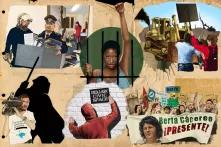Through 25 case studies, Uncalculated Risks explores the nature of the threats and attacks against defenders in development, and examines the role of development finance institutions (DFIs) in mitigating or exacerbating these risks.

Executive Summary
Inclusive and sustainable development requires an environment where all people are free to express their views, to exercise their rights, and to fully participate in the decisions impacting their lives and their communities. Every day, indigenous peoples, communities, social movements, journalists, and individuals are doing essential work protecting their lands and resources from destruction, fighting for equal access to housing and education, exposing corruption and abuse of power, and advocating for investments that reach the poor. Yet today these human rights defenders are increasingly subjected to threats and attacks for their efforts, including harassment, physical violence, criminalization, arbitrary detention, and killing. What’s more, these threats and attacks are increasingly taking place in the context of activities undertaken in the name of development. Through 25 case studies, Uncalculated Risks explores the nature of the threats and attacks against defenders in development, and examines the role of development finance institutions (DFIs) in mitigating or exacerbating these risks.
The Findings
Threats and attacks against human rights defenders in the context of development activities are widespread – involving a broad range of countries, types of defenders, sectors, types of investments, and development financiers. Though they take many different forms, threats and attacks often start with the labeling of communities, groups, and individuals as “anti-development.” Increasingly governments and businesses are utilizing the law to harass and criminalize defenders in an effort to silence them. Stigmatization and criminalization may quickly escalate into more violent attacks. The imposition of development activities without the consent or meaningful consultation of local communities and marginalized groups is one of the key root causes of threats for defenders in development. The process of engagement with local communities is as important, if not more so, than a project’s physical impacts. In some project contexts, including those where civil society space or fundamental freedoms are curtailed, meaningful participation may not be possible. Development finance institutions have a duty to respect human rights and to ensure that their investments are not putting people at risk. Yet too often, development interventions exacerbate risks for defenders due to lack of adequate attention to the rights and interests of local communities and marginalized populations, and to the contextual risks and power imbalances that may cause them to bear negative impacts or to be made vulnerable. Executive Summary DFIs continue to finance projects which cause significant harm to local communities, despite social and environmental safeguards and human rights commitments. Risk and impact assessments often fail to account for social impacts or their distribution on vulnerable groups, and overlook risks stemming from the broader human rights context. Hardly any DFIs systematically examine the enabling environment for public participation and human rights defense. Early warning signs of potential threats to defenders are often missed or ignored. DFIs rely heavily on client reporting or on assumptions of functioning domestic regulatory and legal systems, without adequate due diligence and on the ground monitoring. Communities and defenders also lack access to project information and transparency that would enable early communication of risks and concerns. While grievance, accountability and whistleblower mechanisms can provide an avenue for addressing certain concerns, none is entirely adequate or sufficient for addressing defender related threats. Without adequate safeguards to prevent reprisals, these mechanisms can put defenders at greater risk. DFIs can and have taken action to decrease risks for defenders under threat or to facilitate dialogue between affected communities and other actors. DFIs have a wide range of resources and influence that can be utilized to change the risk equation for defenders under threat, including engagement with governments and companies, public statements in support of the rights of defenders, investigations, suspension of financing, visitation of defenders in jail, and provision of remedy. Unfortunately, DFIs often remain silent in the face of threats and attacks, or responses come too little, too late. DFIs miss opportunities to proactively create moments of leverage to support the rights of communities and defenders and are reluctant to effectively utilize the leverage they have. Defenders and communities are left without protection or remedy for harm. Several DFIs are beginning to grapple with threats to defenders in development. Various independent accountability mechanisms have developed guidelines to prevent and address reprisals against those who file complaints. Some DFIs have published position statements against retaliation; others are developing early warning systems and risk screenings to identify threats to defenders.
But much more is needed.
Effectively addressing the shrinking space for participation in development processes and the growing threats to defenders will require not only a change in policy and practice, but a fundamental shift to place human rights and local communities at the center of how development is conceived and implemented.
You can read the full report here.

